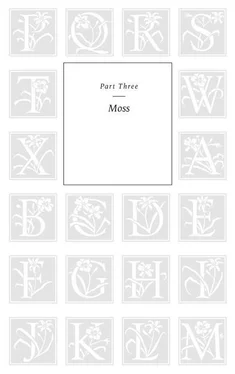Vanessa Diffenbaugh - The Language of Flowers
Здесь есть возможность читать онлайн «Vanessa Diffenbaugh - The Language of Flowers» весь текст электронной книги совершенно бесплатно (целиком полную версию без сокращений). В некоторых случаях можно слушать аудио, скачать через торрент в формате fb2 и присутствует краткое содержание. Жанр: Старинная литература, на английском языке. Описание произведения, (предисловие) а так же отзывы посетителей доступны на портале библиотеки ЛибКат.
- Название:The Language of Flowers
- Автор:
- Жанр:
- Год:неизвестен
- ISBN:нет данных
- Рейтинг книги:4 / 5. Голосов: 1
-
Избранное:Добавить в избранное
- Отзывы:
-
Ваша оценка:
- 80
- 1
- 2
- 3
- 4
- 5
The Language of Flowers: краткое содержание, описание и аннотация
Предлагаем к чтению аннотацию, описание, краткое содержание или предисловие (зависит от того, что написал сам автор книги «The Language of Flowers»). Если вы не нашли необходимую информацию о книге — напишите в комментариях, мы постараемся отыскать её.
The Language of Flowers — читать онлайн бесплатно полную книгу (весь текст) целиком
Ниже представлен текст книги, разбитый по страницам. Система сохранения места последней прочитанной страницы, позволяет с удобством читать онлайн бесплатно книгу «The Language of Flowers», без необходимости каждый раз заново искать на чём Вы остановились. Поставьте закладку, и сможете в любой момент перейти на страницу, на которой закончили чтение.
Интервал:
Закладка:
I set down the tray and walked to the door. Pressing my palms against the glass, I stopped suddenly. Outside, brakes squealed. Then, in front of my door, an old gray pickup truck lurched past, Elizabeth behind the wheel. At the stop sign on the steep corner, the truck rolled back before peeling into the intersection and disappearing up the hill. Turning, I raced up the stairs and into Natalya’s old bedroom, where I crouched down below the window to wait for the truck to return.
In less than five minutes, it did. Elizabeth drove more easily down the hill than she had up, and in a moment she’d turned the corner and was out of sight. I took the stairs two at a time and walked outside. The bride on the curb stood up when she saw me.
“I’m sorry,” she said quickly. “He’ll be here any minute.”
He wouldn’t, though. There was something rehearsed about her apology, as if she’d used the same words to excuse her fiancé for months or years.
“No,” I said, “he won’t.” Maybe it was the chrysanthemum tea, but I suddenly wanted this woman to know the truth. She opened her mouth as if to protest, but the expression on my face stopped her.
“You won’t do our flowers, will you?” She turned away from me, knowing the answer to her question. She would try Renata next; they always did. Renata had the only other flower dictionary identical to mine. I’d asked Marlena to make her a copy a few months before, when we began to have more business than we could handle. Daily, we directed clients to Bloom.
I started up the hill, and from the top I saw Renata descending. We met in the middle, as Grant and I had once done, the afternoon he brought the jonquil. In her hand was a pale pink envelope. My fingers trembled as I took it. I sat down on the curb and placed the envelope in my lap. Renata sat down next to me.
“Who is she?” Renata asked.
The envelope felt hot, and I moved it onto the sidewalk between us. I studied the lines of my empty palms as if looking for the answer to her question.
“Elizabeth,” I said quietly.
We were silent. Renata did not ask more, but when I glanced up, her face was still pinched in question, as if I had not responded at all. I looked back down at my hands. “She wanted to be my mother once, when I was ten years old.”
Renata made a clicking sound with her tongue. With a short fingernail, she picked at a glint of metal trapped in the concrete, but it did not come loose. “So?” she asked. “What did you do?”
It was a question Meredith would have asked, but coming from Renata, it sounded less accusatory than interested.
“I lit a fire.”
It was the first time I had said the words aloud, and a lump rose in my throat at the image they produced. I squeezed my eyes shut.
“My little fire starter,” Renata said. She placed a gentle arm around my shoulders, pulling me to her. “Why doesn’t that surprise me?”
I turned to study her. She did not smile, but her eyes were warm. “So?” I asked. “Why doesn’t it?”
Renata pushed a clump of hair away from my eyes, her fingertips brushing my forehead. Her skin was soft. I leaned into her, my ear pressed against her shoulder so that her words, when she spoke, were muffled. “Do you remember the morning we met?” she asked. “When you stood on my stoop, looking for work, and then came back hours later with proof of what you could do? You handed me those flowers like an apology, even though you hadn’t done anything wrong, even though your bouquet was as close to perfection as I’d ever seen. I knew right then that you felt unworthy, that you believed yourself to be unforgivably flawed.”
I remembered the morning well. Remembered worrying that she’d know the truth about my homelessness, the truth about my history. “Then why did you hire me?” I asked.
Renata ran her hand along the line of my cheekbone. When she reached my chin, she tilted my face up. I looked into her eyes.
“Do you really think you’re the only human being alive who is unforgivably flawed? Who’s been hurt almost to the point of breaking?”
She looked at me deeply. When she looked away, I knew she understood that yes, I did believe I was the only one. “I could have hired someone else. Someone less flawed, perhaps, or at least better at hiding it. But none of them would have had the talent you have with flowers, Victoria. It’s truly a gift. When you work with flowers, everything about you changes. The set of your jaw loosens. Your eyes glaze with focus. Your fingers manipulate the flowers with a gentle respect that makes it impossible to believe you are capable of violence. I’ll never forget the first day I saw it. Watching you arranging sunflowers at the back table, I felt like I was looking at a completely different girl.”
I knew the girl of whom she was speaking. It was the same one I’d glimpsed in the dressing room mirror with Elizabeth, after nearly a year in her home. Perhaps that girl had survived somewhere within me after all, preserved like a dried flower, fragile and sweet.
Renata picked up the envelope and flapped it in the air between us.
“Shall I?” she asked.
3 .
At the sound of the gavel, I blew the white, cottony buds I’d arranged in a line off the table. They scattered to the floor of the courtroom. Elizabeth stood up.
The flowers had been at my seat when I’d arrived, the tangle of baby’s breath— everlasting love —reflecting on the polished tabletop, soft, round orbs bobbing deep within the glossy wood. They were stiff and dry against my fingertips, as if Elizabeth had purchased them for our first court date, before the hearing had been continued, and continued again. Baby’s breath did not wither or mold. With time it grew increasingly brittle, but otherwise it did not change. There had been no reason for Elizabeth to purchase a fresh bunch.
As she stood before the judge, systematically denying a long list of accusations, I snapped the brown, budless stems into inch-long pieces, arranging them like a bird’s nest in the center of the table. There was a pause, and the courtroom fell silent. Elizabeth’s request echoed in my ears: I would ask that you return Victoria to my custody, effective immediately . I didn’t dare look up, afraid my eyes would betray my desire. But when the judge spoke again, it was only to ask Elizabeth to return to her seat. Her request, it seemed, did not deserve a response. She sat back down.
Meredith sat between Elizabeth and me at the long table, flanked by attorneys. My attorney was a short, heavy man. He looked uncomfortable in his suit, leaning forward as the judge spoke and pulling his shirt away from the back of his neck. His notepad was blank, and he did not appear to be carrying a pen. Under the table, he checked the time on his watch. He was ready to leave.
I was ready to leave, too. Only half listening as Meredith and the judge debated my level of need, I manipulated the collection of broken stems on the tabletop, arranging them into the shape of a three-finned fish, a pointed crown, and then a lopsided heart. The brittle pile distracted me from the proximity of Elizabeth, less than five arm lengths away. A level-ten group home, the judge ordered, pending availability. Meredith wrote the decision on my case plan, crossing the courtroom to the bench with a thick stack of papers in her hand. The judge paused, told Meredith to add my name to all the waiting lists for transitional housing, and then signed the top sheet. When I emancipated in eight years, I would still be alone. Without stating it in precise terms, the judge’s words defined my future.
The judge cleared her throat. Meredith returned to her seat. In the silence that followed, I understood that the judge was waiting for me to look up, but I did not. With my finger, I poked a hole in the twiggy heart I’d created from the stems, pulling it open until I saw my own face reflected in the tabletop within. I was surprised by how old I looked, and also how angry. Still, I did not look up.
Читать дальшеИнтервал:
Закладка:
Похожие книги на «The Language of Flowers»
Представляем Вашему вниманию похожие книги на «The Language of Flowers» списком для выбора. Мы отобрали схожую по названию и смыслу литературу в надежде предоставить читателям больше вариантов отыскать новые, интересные, ещё непрочитанные произведения.
Обсуждение, отзывы о книге «The Language of Flowers» и просто собственные мнения читателей. Оставьте ваши комментарии, напишите, что Вы думаете о произведении, его смысле или главных героях. Укажите что конкретно понравилось, а что нет, и почему Вы так считаете.












